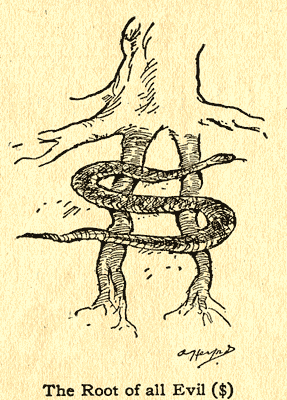Continuing on the subject of debt, I've heard some Christians teach that it is a sin to borrow money and go into debt. One primary verse used in the argument against debt is Prov 22:7, as we discussed in the last post: "The rich rule over the poor, and the borrower is slave to the lender." Romans 13:8 is also frequently used to argue that Christians should not be in debt: "Let no debt remain outstanding, except the continuing debt to love one another, for he who loves his fellowman has fulfilled the law."
Romans 13:8 is also frequently used to argue that Christians should not be in debt: "Let no debt remain outstanding, except the continuing debt to love one another, for he who loves his fellowman has fulfilled the law."
Note that the preceding verse, 13:7, states "Give everyone what you owe him: If you owe taxes, pay taxes; if revenue, then revenue; if respect, then respect; if honor, then honor." Paul's focus is that we must pay what we owe, and not necessarily to stay out of debt. This emphasis on the importance of paying your debts is seen in other verses throughout the Bible:
Proverbs 22:26-27 "Do not be a man who strikes hands in pledge or puts up security for debts; if you lack the means to pay, your very bed will be snatched from under you."
Psalms 37:21 "The wicked borrow and do not repay, but the righteous give generously"
If it was a sin to borrow and become indebted, Jesus wouldn't have said, "Do not turn away from the one who wants to borrow from you." (Matt 5:42) or "Forgive us our debts, as we also have forgiven our debtors." (Matt 6:12)
It is really easy to pick a verse here and there, and create a black and white doctrine out of it. But, we often miss the point entirely. So I would like to ask: what does Bible as a whole teach about this subject?
 The moral question
The moral questionThe most important question is: Why are we borrowing money? Is it for materialism, for the appearance of prosperity (i.e. Mammon ), OR for basic needs, or for the purpose of growing wealth to enable others? Jesus talked profusely about the condition of the heart, which therefore must be the primary consideration in borrowing money. If we are going into debt so we can live beyond our means, this creates a moral problem. And, it will make it increasingly difficult to pay back our debts - which is unacceptable as seen in the verses above.
"One man pretends to be rich, yet has nothing; another pretends to be poor, yet has great wealth" (Prov 13:7). Jesus condemns the servant who buried the talent, rather than use it to gain interest. If Jesus is so hard on people who simply bury their money, how hard would He be on people who negatively go in to debt to buy frivolous things?!?
Yet, if someone uses debt wisely, they may be able to actually create wealth and provide for their basic needs as well as for others.
For those that see debt as a black and white issue: I'd like to know what is the difference between leasing your home from a landlord or loaning money to "buy" your home from a bank? Would Jesus get caught up in this argument?
 We are already indebted to God. Everything is essentially on loan to us. God is the Creator and rightfully owns everything. As He is the provider, we are all called to be His stewards or property managers of all that He has given. Our Creator's generosity benefits all of us, in the same way that the under- privileged can benefit from the ability to borrow money (i.e. start a business, invest, etc).
We are already indebted to God. Everything is essentially on loan to us. God is the Creator and rightfully owns everything. As He is the provider, we are all called to be His stewards or property managers of all that He has given. Our Creator's generosity benefits all of us, in the same way that the under- privileged can benefit from the ability to borrow money (i.e. start a business, invest, etc).
"Wealth and honor come from you; you are the ruler of all things. In your hands are strength and power to exalt and give strength to all." (1 Chr 29:12)
"His master replied, 'Well done, good and faithful servant! You have been faithful with a few things; I will put you in charge of many things. Come and share your master's happiness!" (Matt 25:21)
So, I believe that debt in and of itself is not necessarily right or wrong, nor does the Bible actually forbid the borrowing of money. The Bible does clearly warn about the danger of becoming indebted, and cautions us not to borrow more than we can repay. What matters most is WHY an individual goes into debt and how they decide to USE the debt.
One final thought to consider: "Finish your outdoor work and get your fields ready; after that, build your house." Proverbs 24:27
















